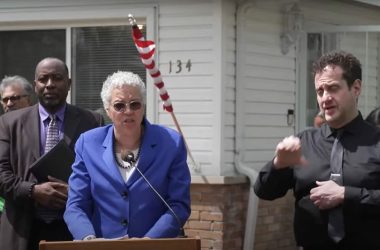Chicago–(ENEWSPF)–December 20, 2012. Northwestern Medicine physicians remind Chicagoans to take extra precautions in extreme weather
A blast of snow, single-digit temperatures and high winds is expected to invade Chicago tonight bringing with it this season’s first winter storm. The wintry mix can pose unfavorable conditions, as well as serious health and safety threats. Northwestern Medicine® experts caution that as temperatures dip, it is important to take warnings seriously and be careful while outdoors.
“We usually see an increase in patients during cold spells,” said David Zich, MD, an internal medicine and emergency medicine physician at Northwestern Memorial Hospital and assistant professor of emergency medicine at Northwestern University Feinberg School of Medicine. “Minor injuries such as bumps, bruises and sprains from slips and falls on the ice are very common, as well as more serious conditions like frostbite and hypothermia.”
To ensure a healthy and safe winter season, Zich recommends the following tips:
- Be cautious of slippery conditions: Icy sidewalks are the cause of many slips and falls. Wear boots that are well-insulated and have good traction on the bottom. Take shorter, slower steps to decrease your chance of falling and walk on shoveled sidewalks when possible.
- Watch for falling ice: Icicles build quickly and can be dangerous for unsuspecting pedestrians. Pay attention to signs for falling ice and be aware of your surroundings as you walk near tall buildings.
- Dress in layers for warmth: Avoid being outside for extended periods of time in extreme cold weather. If you are going outdoors, dress appropriately by layering clothing and wearing a scarf, hat and gloves, making sure to cover all areas of exposed skin.
- Know the symptoms: “Prolonged exposure to the cold can cause serious health problems including hypothermia,” explained Zich. “If you experience symptoms such as shivering, drowsiness or exhaustion, slurred speech, memory loss or confusion, seek medical attention immediately.”
- Recognize the warning signs: Frostbite affects areas of exposed skin including the nose, ears cheeks, fingers and toes. Numbness, loss of feeling or a stinging sensation are early warning signs, and if you find your skin to feel firm or waxy or be white or grayish-yellow in color or, get out of the cold and cover the area exposed.
- Clearing snow: “Even though clearing snow is good exercise, it can also be dangerous,” cautioned Zich. “Don’t work to the point of exhaustion and pace yourself. If you have a history of heart or back problems, check with your doctor before clearing snow or have someone else shovel for you.”
- Prepare your house: More home fires occur during the winter months than any other time of year. Take the proper precautions by having your furnace checked, your chimney inspected and proper smoke and carbon monoxide detectors installed. Make sure all electrical heaters are away from flammable materials, and that combustion heaters are well vented and working properly.
- Eat and drink sensibly: Caffeinated and alcoholic beverages can cause your body to lose heat more rapidly. Drink warm, sweet beverages or broth to maintain body temperature.
- Check on neighbors and elderly relatives: Colder weather can put the elderly at higher risk for health problems and restrict them to their homes due to severe weather. When sub-zero temperatures occur, be sure to check on elderly neighbors and relatives to make sure that their home is adequately heated and that they have the necessary food and other items they need.
- Travel safely: Before you pack up the car and hit the road this season, check the weather forecast. Slow down when driving. Be aware that ice patches can form on bridges, overpasses, and ramps when the rest of the streets are simply wet. It is also a good idea to pack a winter weather emergency kit in your car, complete with extra clothing and blankets, a shovel, sand or cat litter for traction and non-perishable snacks and water.








